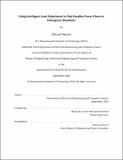Using intelligent load adjustment to find feasible power flows in emergency situations
Author(s)
Nguyen, Edward(Edward Q.)
Download1227507584-MIT.pdf (593.5Kb)
Other Contributors
Massachusetts Institute of Technology. Department of Electrical Engineering and Computer Science.
Advisor
Marija Ilic.
Terms of use
Metadata
Show full item recordAbstract
Economic forces guide power generation and distribution in power grids. In natural disasters and other emergency scenarios transmission lines can become overloaded and fail or power companies may preemptively blackout neighborhoods to prevent cascading failures. Both scenarios cause end users to lose power unnecessarily because the power market cannot create a feasible solution fast enough to avoid these negative outcomes. This thesis presents an adapted max-flow algorithm as part of a protocol that schedules power flows during an emergency. The power flow assignments fall within network constraints such as thermal limits of transmission lines. The algorithm assumes adjustability of load demand and allocates power to loads following the max-min fairness rule. We implement and evaluate this protocol on the IEEE 118 Bus dataset subjected to a number of emergency scenarios. We benchmark the speed of the algorithm against previous max-flow approaches to power grid resiliency and we measure the efficacy of the algorithm by evaluating its ability to supply a critical load percentage to each load bus.
Description
Thesis: M. Eng., Massachusetts Institute of Technology, Department of Electrical Engineering and Computer Science, September, 2020 Cataloged from student-submitted PDF of thesis. Includes bibliographical references (pages 33-35).
Date issued
2020Department
Massachusetts Institute of Technology. Department of Electrical Engineering and Computer SciencePublisher
Massachusetts Institute of Technology
Keywords
Electrical Engineering and Computer Science.